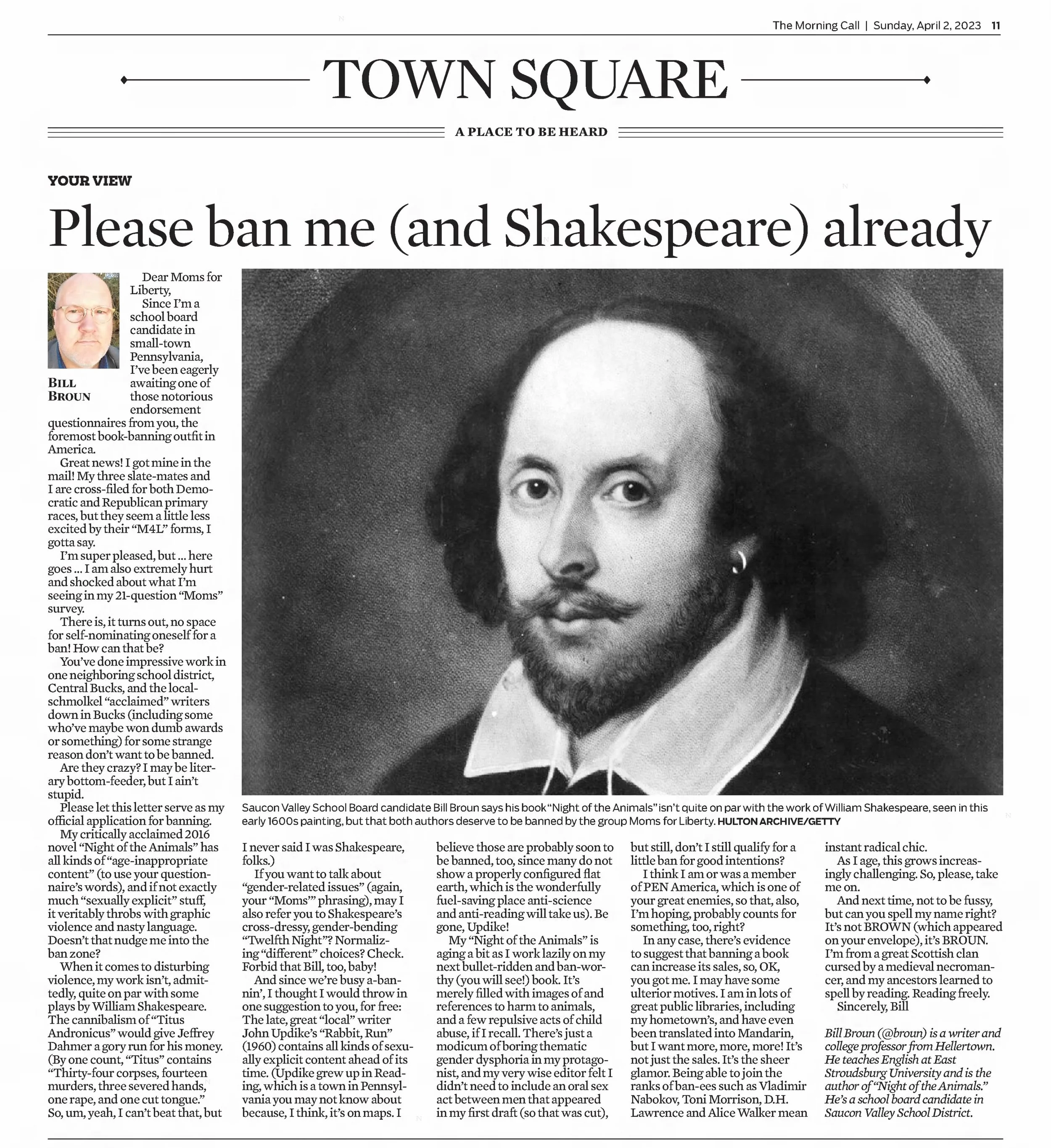Other writing
A selection of past journalism
May 2025: “Guns Are Here to Stay, That’s an Opportunity, Not a Threat”: Allentown Morning Call
Last spring, I failed in a bid to become a council member in Hellertown. My campaign wasn’t too clever, and I lost by seven votes. Life goes on. What I learned about my community was far more important than my political ambitions, and it’s an issue around which we should unite, especially as election season looms again in Northampton County.
August 2017: “Why Confederate Monuments Should Be Removed From Gettysburg”: Allentown Morning Call
Twelve score years ago, and some change, our founders did bring forth a new nation, but it wasn't "conceived in liberty." In fact, Abraham Lincoln in his Gettysburg Address fails to mention that one in five people in the original British colonies was enslaved. For women, blacks, indentured servants and Native Americans in 1776 and long afterward, the proposition that "all men are created equal" was a bitter fiction.
June 2015: "Segregated Comfort": Review of Paul Beatty's The Sellout, Times Literary Supplement.
Last year in St Louis, during a fiery speech by the president of the NAACP Cornell William Brooks, a group of black agitators in their early twenties stood up before a gathering of older Civil Rights figures. Accusing their leaders of standing by while they dodged rubber bullets and tear gas canisters, the protesters demanded, and received, a chance to speak. “This ain’t your grandparents’ Civil Rights movement”, a young St Louis rapper named Tef Poe exhorted them. “Get off your ass and join us!” ...
... In his northern Iranian village, the young protagonist of this admirable if imperfect second novel by the Iranian-American writer Porochista Khakpour seems hideously doomed from the start. With prying neighbours’ eyes and voices held at bay, Zal eventually loses all human contact apart...
Paul Austers fifteenth novel may leave those who havent read his previous fourteen feeling oddly unqualified, for Invisible ideally demands a certain kind of reader: someone literary and intellectual; someone mesmerized by puzzles and Möbius strips; someone with an interest in all things Lacanian, a soupçon of Francophilia and a receptivity to High Postmodernism. Even if you dont have these requirements, the novel offers delicate rewards, but appreciating them needs a patient willingness to inhabit what one character terms the land of If, a slippery world of contingency, of endless unanswerables, of missing and, yes, invisible authors of words and deeds. ...
Paterson, New Jersey, is a region in decline. Corrugated steel shacks, huge petrochemical drums and low-grade housing sit under the roar of aeroplanes taking off from nearby Newark Airport to, presumably, happier places. It seems an unlikely setting for anything wondrous, but Junot Diaz in his much anticipated first novel finds wonder to spare. This world - one of dozens of the immigrant communities teeming within present-day Paterson - is Diaz’s focus, and it becomes in his hands a place of ineffable possibility. ...
What exactly is American about the American short story these days? The question is not addressed directly in this astute, all-new update of 1992's Granta Book of the American Short Story but, considering the books title, how can it be ignored? The gratifying result here suggests it wasnt not by a long shot despite the editors insistence, in his fine introduction (nearly worth the purchase price alone), that there remains less evidence than ever that American stories are fated to be stylistically, thematically, generically different from another nationalitys. Richard Ford, the Pulitzer Prizewinning novelist and short- story writer, brings a deceptively unassuming vision to his task of editing the anthology. His efforts are quietly wonderful. ...
Americans have no problem eating a Big Mac with their hands, but get them to venture into a West African restaurant, where forming balls of fufu (a thick yam porridge) with the fingers is de rigueur, and they will suddenly go Edwardian on you. "What? No silver?" If the breathtaking debut of Chimamanda Ngozi Adichie does nothing else (and it does considerably more), it shows that Nigerian gastronomy is as mannered and complex as anything in Europe or America.
But Purple Hibiscus is more than a sub-Saharan version of Isak Dinesen's "Babette's Feast" with cassava lumps replacing baguettes. In this maturation tale about the sheltered Kambili Achike, a 15-year-old Igbo girl of devastating shyness, the frequent meals help assert a vision of middle-class life that impugns postcolonial pessimism and fear about Africa. ...

